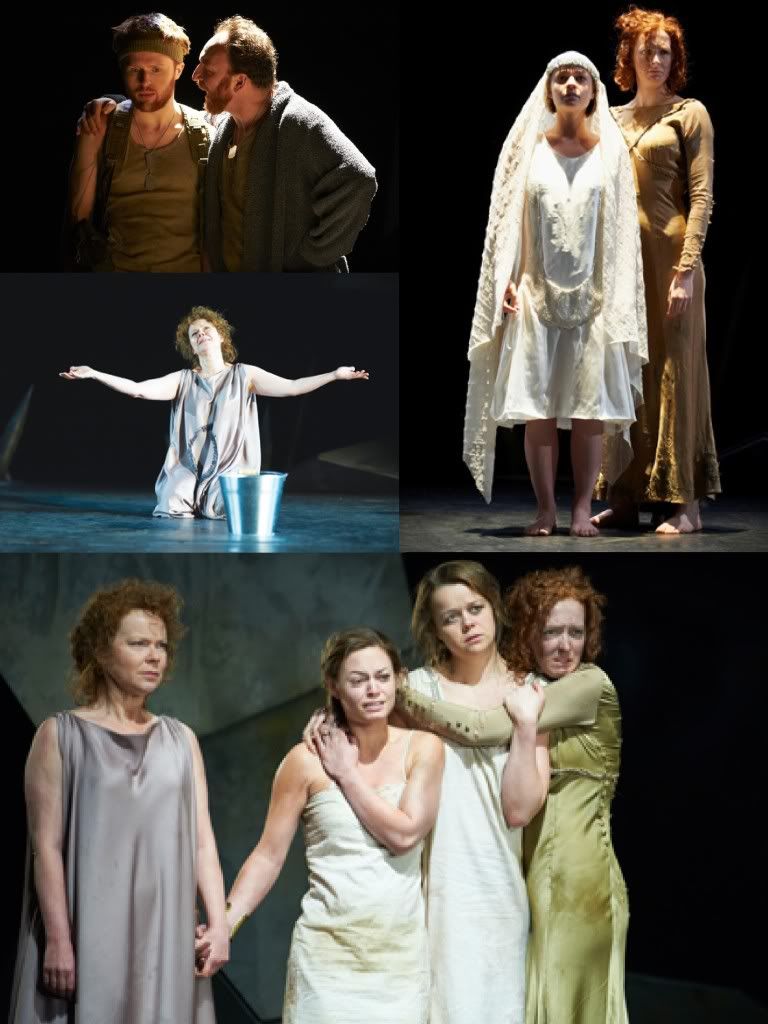Hmmm... I’ve been dreading writing about After Troy since I saw it as I’m struggling enough to get my own head around it, let alone to try to capture it in words or to explain it to others. This is a fusion of both Euripides’ The Women of Troy and Hecuba by poet Glyn Maxwell. Having studied the Greek plays at school and university, I find them fascinating and have been glad to spot a couple of them coming up over the next few months – but that doesn’t change that they can be problematic from a modern perspective. And even with the removal of the chorus, except in the form of Talthybius the Scribe, I think this more modern retelling maintains many of these issues.
It was a completely different artistic style to what I’m used to, understandably as a Greek play, but it also was an incredibly dense and layered production. The language itself was very poetic and sometimes incredibly beautiful, song was also woven throughout and a great deal of thought had been put into making the different cultures vocally distinctive – what was created was a very rich, if sometimes confusing, aural tapestry. The story was similarly thickly layered and fragmented, with the central characters waking moments overlaid by an odd dreamlike, unreal quality of waking and separated by periods of drugged sleep. It felt like the production was trying to do a huge amount of different things, even going as far as adding some meta-criticism on how we handle Greek/Trojan history, and I was left with the sense that I was only grasping a fraction of what was going on.
This fragmentation, also gave the storytelling a somewhat abstract quality, it didn’t build in the way I am accustomed to stories growing. Again, it was perhaps more poetic than dramatic. This impression was heightened by the physical approach to the piece as well – in places slightly surreal, the costumes an odd mix of eras and locations and with highly stylised movement throughout. All these things left me feeling a little disconnected during the performance, particularly emotionally – I wasn’t sure if the production was successful, if it had moved me at all. It wasn’t until later, when I suddenly realised I was crying on the tube, that I realised how deep the impact actually had been. In the weeks since I’ve seen the play it has haunted me slightly, with certain scenes and images pounding heartbreakingly inside my head.
The moment when Eva Matheson’s Hecuba finally used the God’s names with chilling, painful anger. Or when Andromache, beautifully performed by Hannah Barrie, with horrified dawning realisation, learns that she has both revealed her baby son and that he is dead, which still makes me tearful to think of it now. Or the moment when Talthybius played by Oscar Pearce heartbreakingly tries and fails to sing the song that throughout has held the memory of Troy in their heads and loses the women forever.
Which oddly enough doesn’t actually change the fact that I don’t know if I enjoyed this or not, though enjoyed is completely the wrong word. From start to finish this was incessantly bleak, the coldness of the theatre and the constant sound of dripping water seeping through your bones. On all levels it was slightly traumatising with the central performances of all four female actors were truly incredible and it is a joy to see a play with so many strong female roles. Though I also greatly enjoyed Antony Byrne as Agamemnon and Iain Batchelor as Kratos and the detailed, complex relationships that the cast draws out between the characters are fascinating. But there were also many elements I didn’t feel worked.
It certainly is one of the most difficult productions I have seen – I still can’t say exactly how I feel about it, I don’t know if it is mortally flawed or too big for me to encompass and I would hesitate to recommend it to anyone – but I also can’t deny the feeling that this may be one of the greatest productions I’ve seen so far this year. I hope I might get a chance to see it again someday.

No comments:
Post a Comment